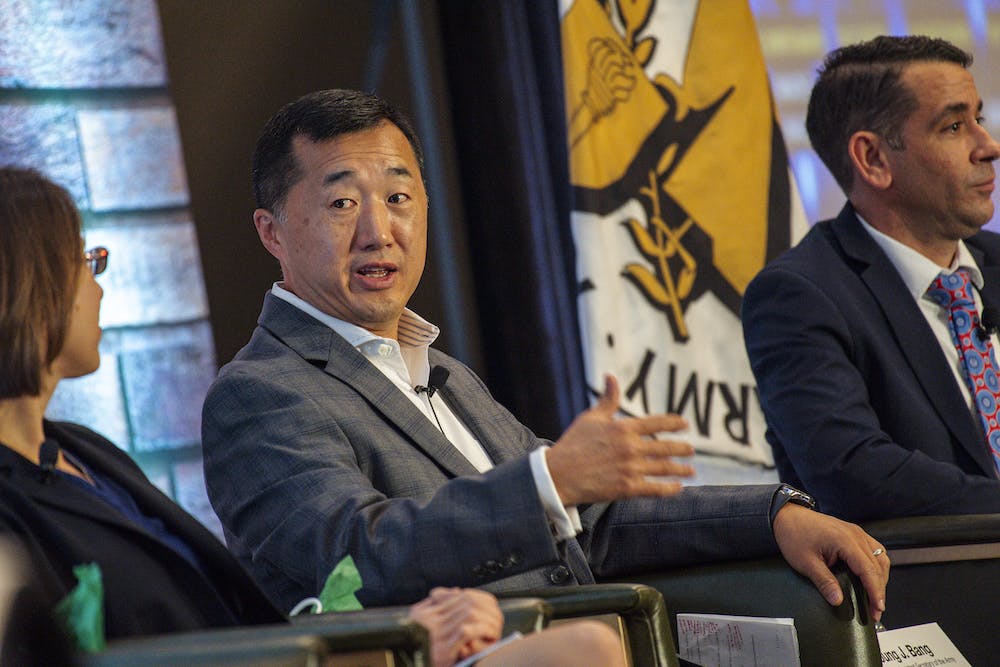HHS Developing Playbook to Overcome Artificial Intelligence Adoption Challenges
HHS CAIO Oki Mek said the agency’s AI playbook aims to help overcome common challenges around AI adoption.

The Department of Health and Human Services is developing an artificial intelligence playbook to help teams overcome common obstacles and challenges that come with implementing AI technologies.
HHS Chief AI Officer Oki Mek discussed the playbook and how it plays into his overall priority of making AI a collaboratively cultivated technology at the agency during a NextGov event July 29. He said that one of the elements that he hopes to include in the playbook is to help with barriers to data acquisition, which he added is especially difficult within HHS.
“Having a playbook could really help in terms of, what are the obstacles that you will encounter when you go on this AI, machine learning journey, because the two biggest obstacles are really the data acquisition, getting the data, especially with Health and Human Services because health records and data are very heavily regulated, so data acquisition will be tough,” Mek said. “We could help provide some guidance and some lessons learned, some best practices around that.”
Mek added that the playbook could also provide some guidance around cleaning data, since cleaning and processing data is a big component of getting it ready for AI usage.
The playbook will also provide definitions around AI, which Mek argued is a broad term that can have different meanings and applications.
“AI is like the word IT — it’s very broad, you’re not really very specific on anything.” Mek said. “[You have to] have a definition of AI, machine learning, you can go into NLP, deep learning and what is the difference between AI and RPA. … How do you tie that to policies and regulations and compliance and governance? It gets very convoluted, but having a clear understanding and clear definition will go a long way.”
Other features of the playbook include guidelines for navigating various privacy laws, such as HIPAA, and IT security policies, Mek said. He added that he’s also trying to develop a capability maturity model to help measure success and progress with AI tools.
“We’ve got to have some kind of capability maturity model,” Mek said. “You can’t manage something you can’t measure, so we want to focus on measuring success and what is our [key performance indicator]? What is our [performance outcome measure]? So that’s the type of framework that we are developing.”
Even though Mek is leading the efforts behind the AI strategies and guidance at HHS, he said that his main goal is to create a collaborative environment around AI — not just within his agency but across the federal government.
“I see myself as a quarterback on the AI initiative, but also to collect information, collect knowledge, information, resources, even … metadata and reshare that information out to the entire department,” Mek said. “I think that could go a long way and not just this department too. We could share that information across federal agencies as well.”
The collaboration that Mek is building at HHS is both a “top-down and bottom-up approach,” as he is forming both an AI council and AI community of practice. These steps are part of focus areas outlined in the HHS AI Strategy released earlier this year, alongside goals to develop an AI-ready workforce and culture, encourage AI innovation and developing AI tools, resources and best practices.
This is a carousel with manually rotating slides. Use Next and Previous buttons to navigate or jump to a slide with the slide dots
-

HHS Aligns AI, Tech Strategy Under its Policy Agency
ONC will have a new name and oversee more c-suites to better shape the future of health care technology policy.
3m read -

Defense Board Calls for Incentives to Faster Tech Adoption, Innovation
The group supports recommendations that would support innovators at the department and optimize collaboration.
4m read -

The Future of AI at the Defense Department
To maintain its competitive edge, the Defense Department is exploring artificial intelligence across the enterprise.
14m read -

Large Language Models Won't Save Army's Data Overload
Data is critical for a connected Army, but managing datasets will require technologies that are useful at the tactical edge.
6m read








